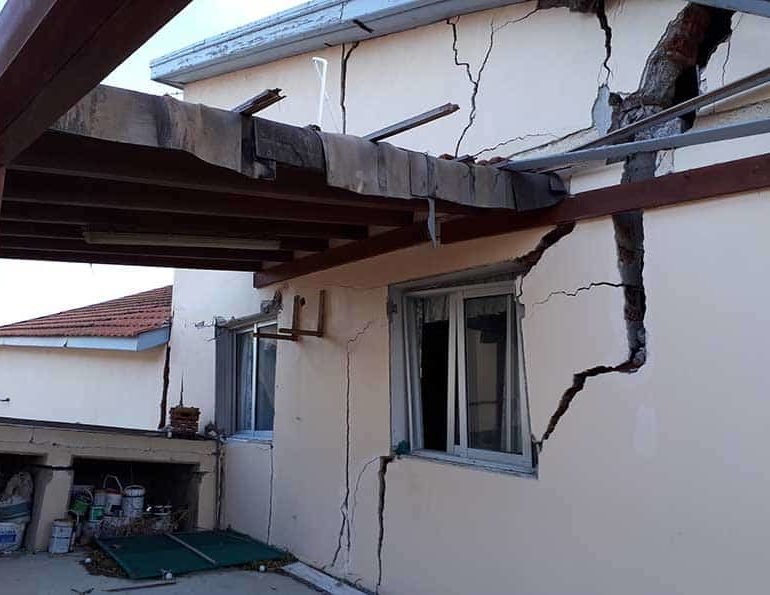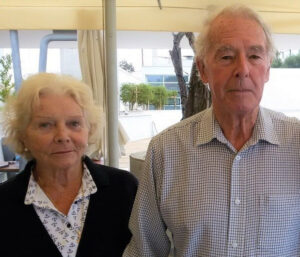People who were living in Pissouri landslide homes accuse the government of double standards in comparison with fire-stricken areas
Residents of Pissouri homes that have either been destroyed or seriously damaged by a landslide have yet to receive a penny from the government or any assistance and have accused them of double standards.
The comments came in the wake of the deadly fires in Arakapas in July that claimed the lives of four people and the ensuing swift approval by the cabinet of a €6m budget. This will go to compensate people who lost their homes and livelihoods, including families of four Egyptian workers who died. A 67-year-old man is suspected of starting the fire in Arakapas which destroyed over 55 square kilometres.
However, the state’s ‘discriminatory’ response has angered Pissouri residents who have appealed to the government to step in for many years, and once again raises the question of what constitutes a natural disaster, resident Simon Carroll said, speaking to the Sunday Mail this week.
“The wildfires are extremely sad and shouldn’t have happened, but there is a real sense of injustice and I think there is discrimination against us. We don’t want to leave, many of the other residents have had to. We want to stay here, our son was born here and attends a local school,” he said.
Previously, the government had ruled out direct compensation to the affected property owners because that would be tantamount to an admission of responsibility by the state.
“It appears that 80 per cent of homes lost in the recent wildfires in Arakapas did not have building permits and whilst sad and disastrous for those families concerned, no doubt they have received the government recovery package that was put together within two weeks of them losing their homes,” Carroll added.
What actually constitutes a natural disaster, a wildfire, a slow-moving landslide? he asked. “We are dying by inches every day and no-one cares. Everybody should be treated fairly and the people of Pissouri have not been,” he said.
Many of the affected homes in Pissouri have virtually collapsed, the result of a continuous and accelerating landslide and a number of homes have been deemed unfit for habitation. Homes and gardens are ripped apart, walls and pools are collapsing and roads split, buckled and impassable.
“My question is why Pissouri residents, who have built legally on land identified by the district planning office and zoned it for building development, which had the proper building permits and received title deeds, received no assistance whatsoever from this government. More than twenty homes have received compulsory eviction notices because of the destruction caused by the reactivation of a slow-moving landslide. Surely this is the result of a natural disaster too,” added Carroll.
British residents whose homes haves been destroyed have also featured on a number of TV and radio shows in the UK highlighting their plight, and retirees Kayt and her husband Peter Field, once again appeared on a BBC TV show via Zoom around six weeks ago
“We had nothing to add as an update, as nothing at all has happened,”, Peter said.
“We want to know when we will be getting some sort of help for losing our homes. We are despairing.”
The couple were evicted in March 2015, when officials, “just slapped a notice on their door” and no help was offered and no care for people was shown, Peter said.
The Fields purchased their four-bedroom villa with a substantial garden and pool in 1993, and decided to retire to Cyprus, a country they fell in love with when Peter was stationed on the island.
Now, it has all but collapsed and they have no means of living elsewhere. A kindly neighbour offered them a property to live in until they are able to get back on their feet.
No insurance company will insure against landslide damage and the properties in Pissouri were built by different developers.
In 2015, several property owners came together to form the Pissouri Housing Initiative Group (PHIG) and Georgia-Elina Zoi, a lawyer represents some of the home owners.
It appears that the government’s budget for work to shore up the area and make it safe has been slashed from €32m to €8m.
In 2020, Interior Minister Nicos Nouris pledged that the government was determined to move ahead with “a major stabilisation project” with the residents’ safety being the top priority.
However, Zoi said that the government is now only going to spend €8m (the amount in the state budget for 2021) and only for the construction of one pile-wall. It will do none of the stabilisation work on the landslide area, she said.
“The Cypriot government will proceed only with the construction of the pile-wall at the bottom of the hill behind the cemetery. The company had suggested the construction of three such pile-walls and that this work would follow the stabilisation work at the foot of the landslide.”
Nothing is scheduled for the rest of the area, she stressed. ”Even if a piled wall is constructed, it will only protect the hill and the traditional village with the Cypriot houses. The landslide area will not benefit at all,” she added.
Regardless of the causes that triggered the landslide and continue to accelerate it, properties and infrastructure is destroyed, and a landslide is a natural disaster, she said. However, it seems that some of those in power have decided to abandon the foreign residents of the area and focus only on constructing one pile wall, the same project they had decided to do even before the survey, before the understanding of the landslide and before any research, she said.
In addition, there is still no evacuation plan, nor any help or plan for the landslide area and its residents, she added.
“If there was an earthquake or heavy rain, which is a real possibility, there is no evacuation plan in place. Access to homes is very tricky and in heavy rain the ground can move very quickly,” said Carroll.
Previously, Nouris stressed that the goal of the government was not only to restore the territory of the region but to upgrade it. Athletic facilities were also planned.
“The main work for protecting the landslide area, the residents and their investments in Cyprus was the massive stabilisation work at the foot of the landslide and this is now not even in the plans of the government,” said Zoi.
Work was estimated to conclude at the end of 2022, but as yet, ‘not one sod of earth has been turned,” said Carroll.








Click here to change your cookie preferences